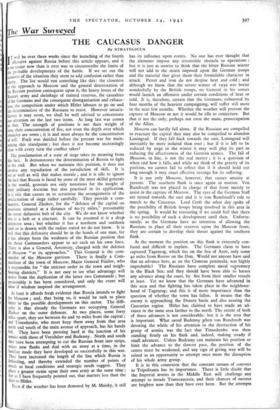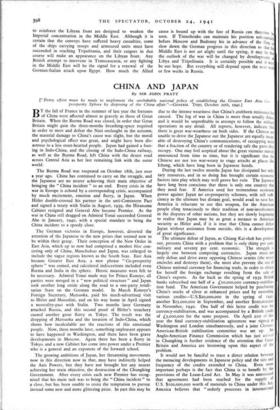The War Sul veyed
THE CAUCASUS DANGER
By STRATEGICUS
T will be over three weeks since the launching of the fourth I offensive against Russia before this article appears, and it is no easier now than it ever was to circumscribe the limits of the probable developments of the battle. If we set out the elements of the situation they seem to add confusion rather than clarity. The list would run something like this: the closeness of the approach to Moscow and the general deterioration of the Russian position consequent upon it, the heavy losses of the Russian army and shrinkage of trained reserves, the casualties of the Germans and the consequent disorganisation and exhaus- tion, the compulsion under which Hitler labours to go on and the determination of the Russians to resist. However unsatis- factory it may seem, we shall be well advised to concentrate our attention on the last two items. At long last war comes to that. The strength of positions is not their weight of iron, their concentration of fire, not even the depth over which obstacles are sown ; it is and must always be the concentration of will. Foch was derided before the present war for main- taining this standpoint ; but does it not become increasingly clear with every turn the conflict takes?
The proclamation of a state, of siege takes its meaning from this fact. It demonstrates the determination of Russia to fight to the end. But when we maintain this position, it does not involve any repudiation of the jurisdiction of skill. It is wit as well as will that makes morale ; and it is idle to ignore the fact that Russia is faced by some of the most skilful generals in the world, generals not only notorious for the insight of their military doctrine but also practised in its application. It is this that causes us to scrutinise the arrangements of the proclamation of siege rather carefully. They provide a com- mander, General Zhukov, for the " defence of the capital on positions situated at a distance of 6o-75 miles," presumably the outer defensive belt of the city. We do not know whether this is a belt or a cincture. It can be assumed it is a deep defensive area ; but whether it has a northern and southern limit or is drawn with the radius stated we do not know.. It is well that this defensive should be in the hands of one man, for it has always been the weakness of the Russian position that the three Commanders appear to act each on his own lines. There is also a General, Artemvey, charged with the defence of Moscow " at its approaches." This General is the com- mander of 'the Moscow garrison. There is finally a Com- mandant of the town of Moscow, Major General Finilov, who is responsible for " the strictest order in the town and neigh- bouring districts." It is not easy to see what advantage will derive from the duplication of the latter two Commands ; but presumably it has been considered, and only the event will show if wisdom inspired the arrangement.
At least it affords fresh evidence that Russia intends to fight for Moscow ; and, that being so, it would be rash to place limits to the possible developments on this sector. The diffi- culty is that already the Germans are occupying General Zhukov on the outer defences. At two places, some forty miles apart, they are between 6o and 70 miles from the capital ; and Timoshenko, who must keep them away from that area north and south of the main avenue of approach, has his hands full. They have been pressing hard at the junction of his armies with those of Vorishilov and Budenny. North and south they have been attempting to cut the Russian front into strips, create new flanks and deal with an army at a time, in the familiar mode they have developed so successfully in this war. They have increased the length of the line which Russia is defending, and thereby extended the number of points of attack as local conditions and strategic needs suggest. They place a greater strain upon their own army at the same time ; but as I have frequently pointed out, that matters less than the dust to Hitler.
Even if the weather has been demoted by M. Maisky, it still has its influence upon events. No one has ever thought that the elements impose any irresistible obstacle to operations ; but it is just as unwise to think that the bitter Russian winter will not add to the strain imposed upon the German troops and the material that gives them their formidable character in attack. Petrol and iron do not despise heat and cold ; and although we know that the severe winter of 1939 was borne wonderfully by the British troops, no General in his senses would launch an offensive under certain conditions of heat or cold. It is, therefore, certain that the Germans, exhausted by four months of the heaviest campaigning, will suffer still more in the next few months. Whether the weather will prevent the capture of MOSCOW or not it would be idle to conjecture. But that is not the only, perhaps not even the main, preoccupation of the Allies.
Moscow can hardly fall alone. If the Russians are compelled to evacuate the capital they may also be compelled to abandon Leningrad. If they fall back towards the east, Leningrad will inevitably be more isolated than ever ; but if it is left to be reduced by siege in the winter it may well play its part in reducing the effectiveness of the German armies. The fall of Moscow, in fine, is not the real matter ; it is a question of when and how it falls, and while we think of the gravity of its position, we cannot fail to reflect that if it should hold out long enough it may exact effective revenge for its suffering.
It is not only Moscow, however, that causes anxiety at present. The southern flank is once again in motion. Von Rundstedt was not placed in charge of that front merely to assist in the capture of Moscow. The eyes of the German Staff are turned towards the east and it is von Rundstedt's role to march to the Caucasus. Lord Croft the other day spoke of the possibility of British troops being involved in this area in the spring. It would be reassuring if we could feel that there is no possibility of such a development until then. Unfortu- nately, as the Germans have no intention of allowing the Russians to place all their reserves upon the 'Moscow front, they are certain to develop their thrust 'against the southern flank.
At the moment the position on this flank is extremely con- fused and difficult to explain. The Germans claim to have captured Tagenrog, which lies on the Sea of Azov, only some 4o miles from Rostov on the Don. Would not anyone have said that an advance here, as on the Crimean peninsula, was highly improbable? The Russians have complete naval supremacy in the Black Sea; and they should have been able to harass any advance along the coast, by fire from their smaller vessels at least. Yet we know that the Germans have advanced in this area and that fighting has taken place in the neighbour- hood of Tagenrog; and this is of more importance than the question of whether the town has fallen. It means that the enemy is approaching the Donetz basin and also nearing the Caucasian region. Hitler has claimed to have made an ad- vance in the same area farther to the north. The extent of both of these advances is not considerable; but it is the area that is important. What saved Budenny when von Rundstedt was devoting the whole of his attention to the destruction of his group of armies was the fact that Timoshenko was then standing firmly on his flank and, indeed, making steady if small advances. Unless Budenny can maintain his position or limit the advance to the slowest pace, the position of the centre must be weakened, and any sign of giving way will be seized as an opportunity to attempt once more the disruption of his whole army group.
It is in this connexion that the constant stream of convoys to Tripolitania has its importance. There is little doubt that the Imperial armies in the Middle East will challenge any attempt to invade Transcaucasia, and their chances of success are brighter now than they have ever been. But the attempts to reinforce the Libyan front are designed to weaken the Imperial concentration in the Middle East. Although it is certain that the convoys have suffered heavy casualties, some of the ships carrying troops and armoured units must have succeeded in reaching Tripolitania, and their. cargoes in due course will make an appearance on the Libyan front. Any British attempt to intervene in Transcaucasia, or any fighting in the Middle East will be the signal for a renewal of the German-Italian attack upon Egypt. How much the Allied cause is bound up with the fate of Russia can therefore seen. If Timoshenko can maintain his position substantial' before Moscow and Budenny his in advance of the Don, slow down the German progress in this direction so that di Middle East is not set alight until the sprin,g, it may be that the outlook of the war will be changed by developments II Libya and Tripolitania. It is certainly possible and it must be our hope. But everything will depend upon the next ued or few weeks in Russia.



























 Previous page
Previous page